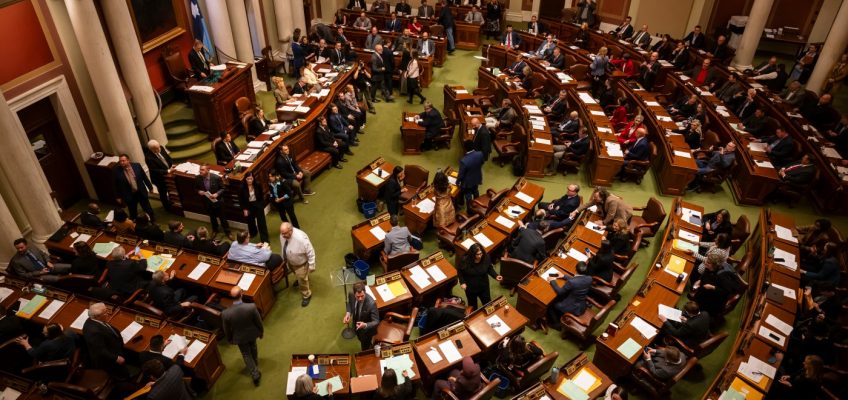A Republican-backed bill before the Minnesota House aimed at opening more records at the state attorney general’s office failed on party lines Thursday in the chamber’s first floor vote of the legislative session.
The measure would have changed the wording of a state statute to open more of the attorney general’s investigative records. Many of those are private because of a 2022 state Supreme Court decision that regarded the records of groups and organizations as subject to the same protections as individuals.
House Majority Leader Harry Niska, R-Ramsey, told reporters at a Thursday news conference that the decision gives Democratic-Farmer-Labor Attorney General Keith Ellison special protection against public scrutiny other state agencies don’t enjoy.
“This should be an obvious gimme vote for everybody; to say we are for transparency,” he said. “We are for the government not hiding what it’s doing when there’s no privacy interest that needs to be protected of an individual person.”
It’s worth noting: The Minnesota Legislature has protections of its own. Lawmakers’ records are exempt from the Minnesota Data Practices Act. Niska said he didn’t think that exemption should change.
The 2022 Supreme Court decision came as the result of a lawsuit filed by Energy Policy Advocates against Ellison seeking information about outside groups believed to be funding positions helping the office with its lawsuit against the petroleum industry.
Justices narrowly sided with Ellison 4-3, with Justice Paul Thissen in his dissent describing the majority’s interpretation of state open records law as “somewhat Orwellian” for applying a different definition to the attorney general’s office.
DFL Attorney General Keith Ellison said the push was tied to his office’s ongoing litigation against oil companies like Exxon Mobil for allegedly misleading the public that fossil fuels aren’t linked to climate change.
Ellison and DFL lawmakers said they doubt Republicans’ declared intent of helping government transparency. They instead tied the bill to the ongoing legal battles.
“This is bad legislation motivated by the fossil fuel industry,” Ellison said.
Further, Ellison said the bill would potentially expose sensitive information held by his office, including the trade secrets of corporations his office is suing.
The potential for exposure of sensitive information could make other states less likely to invite Minnesota to multi-party consumer protection lawsuits, Ellison said. One example he pointed to was Minnesota’s involvement in a settlement with pharmaceutical companies blamed for causing the national opioid addiction crisis.
Bill isn’t dead
Despite the failed House floor vote Thursday, the bill could come back in a different form later in the session. Republicans voted to table the bill after it failed.
Right now, House Republicans are using their current one-seat majority at the Capitol to advance bills to the floor, using what could be a temporary advantage over their DFL colleagues before the chamber potentially returns to a 67-67 tie next month after a special election in a Roseville-area district.
Even though Republicans have an organizational majority, they are one vote short of the 68 needed to pass bills. Republicans say a big part of the reason they brought the bill to the floor Thursday was to get DFLers’ votes on the record.
“It was important to us that we move this bill forward while we have the procedural ability to do that,” said Niska, who told reporters there would be more similar Republican-backed measures on the floor in the coming weeks.
Related Articles
DFL lawmakers, Ellison back legislation to purchase, then forgive, Minnesotans’ medical debt
Senate GOP files new ethics complaints against Nicole Mitchell, state senator facing felony burglary charges
Trump moves on budget, policy spill over to Minnesota Legislature
SPPS Board of Education to vote on cell phone policy Tuesday
Minnesota GOP files first petitions aimed at unseating DFL House members


Leave a Reply